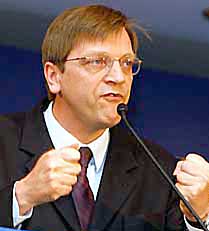A Saviour for the EU
From the desk of Alexandra Colen on Wed, 2005-10-12 11:29

Lo, the small kingdom of Belgium has brought forth a messias who will save the EU. At least, that is how Prime Minister Guy Verhofstadt seemed to see himself yesterday as he presented his “state of the union” speech for the opening of the Belgian Parliament’s year.
Verhofstadt, who was France's and Germany's candidate for President of the European Commission last year, warned that Europe is in danger of being left behind in the changing world of the 21st century. “The negative outcomes of the referendums in France and the Netherlands have plunged the Old World into a crisis”, he said. “The failure of the European Council to agree on budget for 2007 to 2013 has served only to reinforce this crisis.”
With messianic fervour he continued: “Nevertheless, the ratification of the European Constitution goes on,” and urged the regional parliaments of Belgium (who also have to ratify) to get on with the process and ratify the Constitution before the year’s end, “so as to lend weight to those who favour European integration.” He announced that the Belgian government will “urge the other member states who have not yet ratified the Constitution to continue the process.”
Unhindered by its citizens, who were not allowed to vote on the matter in a referendum, Belgium’s national parliament was quick to ratify and had planned great pomp and ceremony to mark the occasion, but had to cancel the festivities due to the illness of the Speaker of the Belgian Chamber of Representatives. If they had continued as planned on 19 May the festivities would have yielded a bitter aftertaste when, only ten days later, on 29 May, the citizens of France, followed by the Dutch on 1 July, rejected the Constitution.
Eurozone
In his speech yesterday the Prime Minister continued:
“Meanwhile we are in a period of reflection on the future of Europe. There should be reflection, but it would be much better if we could then also make choices. Our position is clear: we want more Europe, not less. We want not just a free trade area but a European political entity that can develop adequate economic and social strategies, foreign and European defence policies. In short, we want a strong Europe.”
“What, however,” he said, “if the ratification of the Constitution and, with that, further integration within the current structure proves impossible?” No problem, for Belgium has a strategy:
“In that case our country will carry on anyway, with other members. Not on a pick and choose basis but on a structural basis, founded on the Eurozone, which is the most adequate instrument for this type of operation. Of course Belgium would prefer to strengthen the Union together with all its members, but we will not allow the European project to be watered down.”
Those who might entertain second thoughts about the way the European Union was heading before the French and the Dutch rejected the Constitution are warned: the Belgian government will not tolerate any dissent. Moreover, the Prime Minister enthusiastically announced “a summit of Eurozone leaders in 2006” to kickstart Belgium’s salvation of the old EU.
